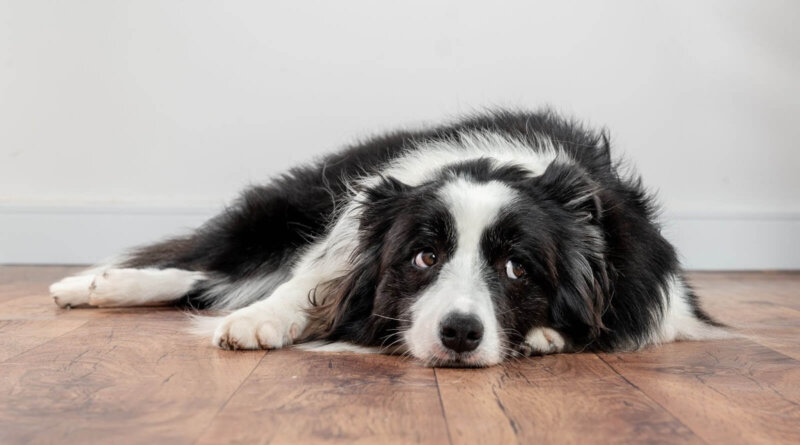Does Your Dog Resent You?
We’ve probably all experienced that “guilty dog” look — the one that they give us when we catch them doing something wrong and discipline them for it. Body lowered, ears, head, and tail down, maybe squinty eyes.
But is it really guilt that the dog is demonstrating, or just submission? And what happens in your dog’s mind after the discipline is over? Does your dog forgive you?
Fortunately, we know enough about dog behavior to understand our pets and how their emotions affect their behavior.
Dog Psychology: Do Dogs Hold Grudges?

When we humanize dogs, it’s easy to put labels on their behavior that don’t really apply. Your teenager might resent you for a while if you ground them or take away privileges, and they’ll let you know it. Your dog doesn’t think the same way.
Even if your pup is smart, dogs don’t have the same cognitive ability to experience, process, and exhibit emotions like humans do. And in most cases, their emotions (especially negative ones) are short-lived.
Dogs live in the moment, so the emotions of that submissive display last exactly as long as the dog is displaying it.
Your Dog’s Emotions and You
A good example of this is the typical dog’s reaction when the dog owners return home after a long day of being gone. The dog may have spent all day moping around, waiting for you to come back, but the second you walk in the door, all of those feelings are gone, replaced by happiness (and sometimes excitement) because, in this moment, you’re there again.
Your canine companion may be upset in the moment if you scold him or trip over him, but he won’t hold that against you. That’s just not how dogs work!
Understanding What Your Dog Really Needs

Have you ever accidentally stepped on your dog’s paw or tail, making them yelp and jump away? Don’t worry. They didn’t take it personally. In fact, a lot of dogs will also display submissive behavior after getting stepped on.
What if you take away a dog’s toy because playtime is over? They may act a little miffed right in that moment, but they aren’t going to spend the rest of the day thinking, “You took my favorite toy. I hate you.”
If you want to make sure that your dog is never resentful, then you as a Pack Leader have to provide what your dog really wants — rules, boundaries, and limitations — and what your dog really needs: exercise, discipline, and affection, in that order.
Dogs learn best with a consistent routine. The same principle can be applied to encouraging healthy behaviors and developing a good relationship with your pup.
How to Build a Stronger Bond With Your Dog: Using Positive Reinforcement and Psychology
Dogs respond to our energy and emotions. When humans experience and exhibit intense emotions like fear or anger, most dogs will react to these feelings with submission. It’s important to recognize how your emotional state can affect animals and make an effort to strengthen your bond so that
Socializing With Others
To keep your dog happy, make sure that she is socialized and gets along with other dogs and people, but remember that your dog’s mood ultimately comes from your energy.
You can’t socialize a dog if you’re afraid of something bad happening, even if something bad has happened in the past. Being scared in the present because of something bad that happened in the past is a human trait, not a dog trait.
Modeling Body Language
Dogs don’t hold grudges. They only appear to if the humans around them react negatively, because then we’re telling our dogs to do the same.
If your body language conveys anger, annoyance, or frustration, your dog will be more likely to respond in a submissive way. So as long as you don’t maintain that attitude and body language for longer than is appropriate, your dog will adapt, recognizing that the moment has passed and they are safe.
Creating a Healthy Environment
Whether you’re stressed from work or your pet has gotten into something they shouldn’t have, you may show your frustration on occasion, which signals to your pet that they should stay quiet and even hide until your energy has calmed down. This is normal and can be a good indicator, especially after they’ve done something wrong, that they will be less likely to do the same thing again.
However, an environment where your dog is often afraid of you and your emotions isn’t healthy. You need to foster a healthy environment for your pup to ensure they are happy, calm, and engaged. Use gentle words as much as possible, spend time with her, and provide fun things, like toys and games, for mental stimulation. Offer positive reinforcement for good behavior, as well. All of these things will encourage your dog to be resilient and loving.
Your behavior and their environment directly influence how your dog behaves.
When to Seek Professional Help for Your Dog’s Behavior: How a Dog Trainer Can Help

Rescue dogs and pets from uncertain backgrounds may react more strongly to intense emotions, and in cases where dogs demonstrate aggressive behavior, you may need to seek out professional advice from a dog trainer to ensure you are doing everything you can to make your pet feel comfortable and safe.
Aggressive behavior can be troubling, but for some dogs, obedience training can help. Dogs need structure, and training classes not only provide a routine but also offer owners a way to teach positive behaviors that combat a dog’s unwanted behaviors.
While training won’t solve all behavioral issues, getting a professional’s help can address negative behavior that results from your dog’s past. Taking the steps necessary to make your dog feel more comfortable and safe in your home by introducing rules, boundaries, and limitations is essential as a Pack Leader – and your pet will be grateful!
What We Can Learn From Our Furry Friends

Do dogs hold grudges? No. But they will respond to your emotions, and if you show signs that you’re angry with them too often, their behavior may begin to reflect that.
As social animals, dogs are heavily influenced by how their owners interact with them. The way that our dogs behave can give us some good insight into how we can better approach our relationships with our pets and each other.
Patience
If he senses you are agitated, your four legged friend won’t come pester you until you give him attention. Instead, your dog will likely leave you alone until you calm down. This level of patience is something that we all could learn from!
Forgiveness
A dog’s trust is easily won and hard to lose. Even if your emotions make your dog feel bad on occasion, he won’t resent you for it. So long as you don’t treat him poorly and you instead give him the structure and affection he needs and wants, he’ll likely forgive any outbursts and move on more quickly than most people do.
The Value of Our Relationships
Dogs are man’s best friends, and virtually any person with a pet dog will agree. Dogs may mope and whine when they’ve been scolded or when you’re in a bad mood, but they will also give their owners unconditional love.
The relationship between humans and dogs is special, and the way dogs are sensitive to their owners’ emotions can inspire us to treat our relationships with our pets and other people with more appreciation. Many dogs just enjoy spending quality time with their owner. For people, making the same effort to spend time with each other goes a long way, too.
Will My Dog Forgive Me? Absolutely.
The next time you have to discipline or correct your dog, don’t worry. She won’t resent you for it. She won’t even remember it five minutes later. This is one of the greatest lessons we can learn from dogs: how to get over it.
Have you seen behavior from your dog that you thought was resentful? What do you think was really going on? Tell us in the comments.




